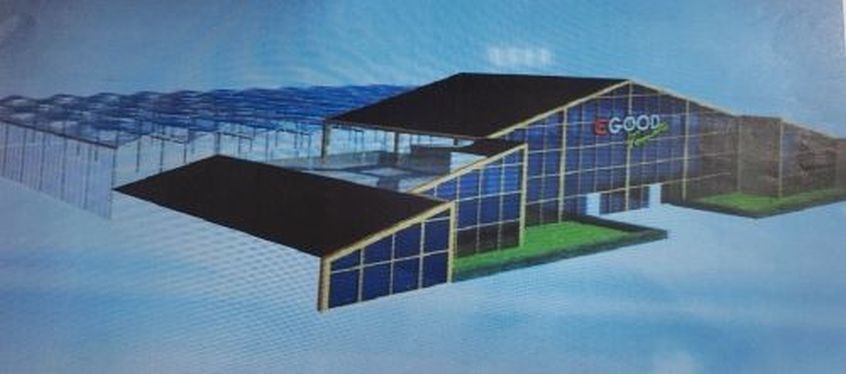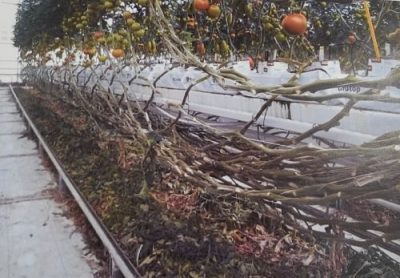Okinawa Products Enterprise Corporation imports technology from Taiwan to build plant factory in Tomigusuku, will grow organic produce

A graphic depicting the new plant factory being built by the Okinawa Products Enterprise Corporation
September 7, 2021 Ryukyu Shimpo
By Wu Li Jun
Okinawa Products Enterprise Corporation (OPEC, Naha, Tomoaki Haneji, president) has imported farming technology from Taiwan, and are continuing on constructing a plant factory in Tomigusuku. They are planning on getting it operational this year, and hope to have their first harvest as soon as January 2022. Similar to other gardening facilities, it will cultivate organic vegetables using sunlight and hydroponics. Most plant factories in Okinawa rely on artificial light sources, so one that uses natural sunlight and hydroponics is rare. The produce they raise will be sold to mainland Japan, and they are aiming for it to be a new “product” for Okinawa.
The plant factory will have 990 square meters of floor space, and will be built with a 4-meter-tall reinforced steel frame. A special high-durability vinyl was imported from Taiwan, which will be used to cover the walls and roof, and will help regulate the temperature and humidity of the growing environment. Starting with bitter melon, the factory plans to grow produce such as tomatoes, sponge gourds, bell peppers, and melons.
Since the vinyl being used allowed sunlight to pass through it, the factory will have much smaller electrical costs compared to facilities that rely entirely on LEDs for light.
The plant factory being built by OPEC will be operated by a subsidiary, O.T. agriculture (Hiroiwa Miyagi, representative director), and are planning to use it as a model for similar plant factories throughout Okinawa.

An example of the growing set up being prepared by the Okinawa Products Enterprise Corporation
According to Miyagi, hydroponic plant factories produce faster than traditional gardening. Tomatoes that are grown in soil usually ripen for harvest twice per year, however the factory anticipates a harvest eight times per year. Since their ability to use natural light is a significant cost-cutter, they can also set the price for their produce lower.
Miyagi stresses, “Mass production allows you to sell produce at a lower price, so we can compete with produce grown outside of Okinawa. Since Okinawa has few value-adding industries, this can also contribute to Okinawa’s economy. I want this new plant factory to build a new industry in Okinawa.”
(English translation by T&CT and Sam Grieb)
Previous Article:Okinawaya store constructs 3-meter tall Shisa statues on Kokusai-dori to provide spiritual protection from COVID-19 for Okinawa
Next Article:LaSalle Parsons, Catholic priest and human rights activist in Okinawa, dies at 90
[Similar Articles]
- Okinawa’s largest plant factory to be built in Ogimi
- Hijiki seaweed harvest begins
- Processing of sugarcane starts – lowest output since Okinawa’s reversion
- Ryukyu indigo dye shortage threatens dye craftsmen
- Rice planting starts in Iriomote Island, earliest harvest in Japan
 Webcam(Kokusai Street)
Webcam(Kokusai Street)


